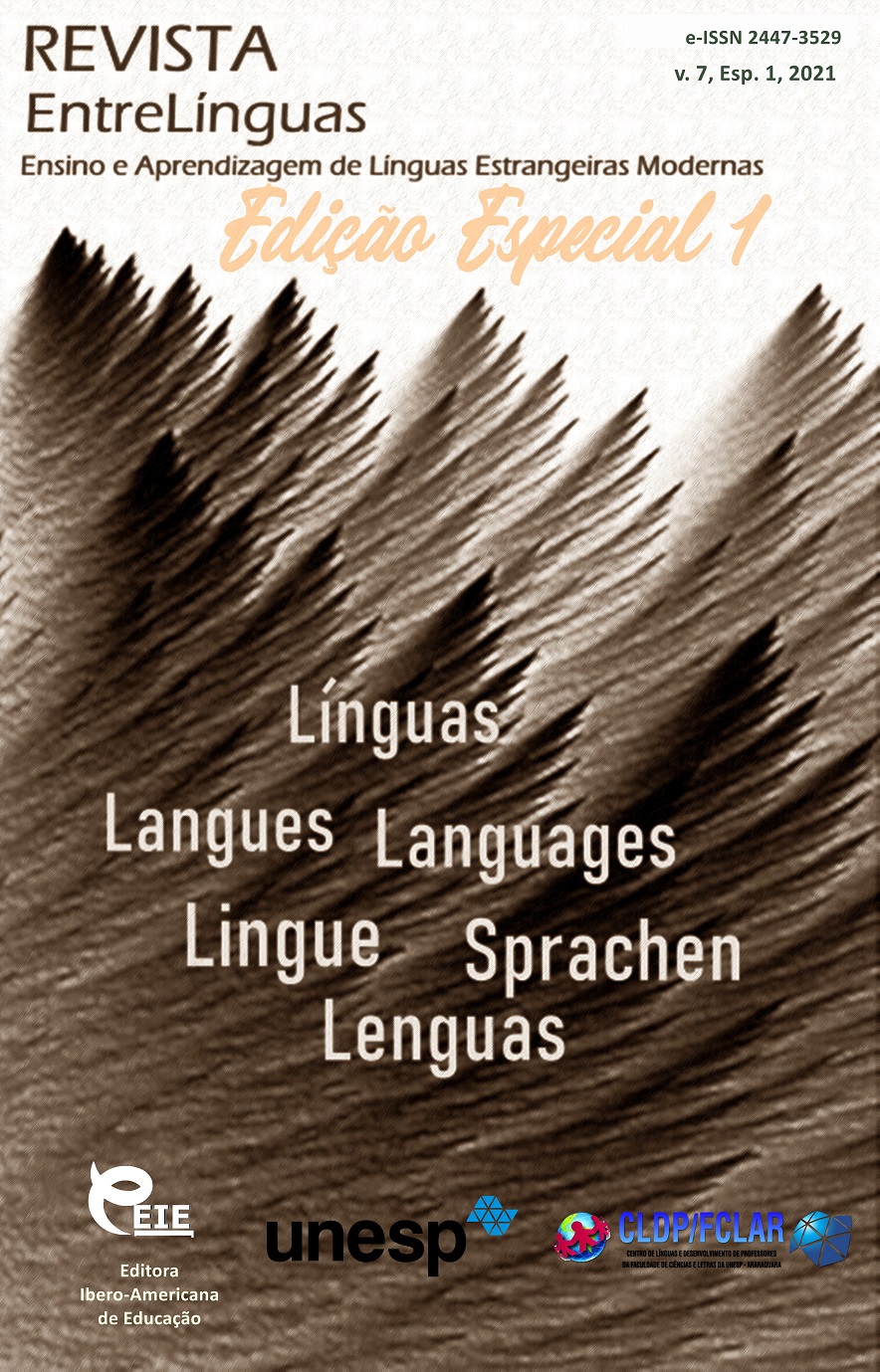Abordagem orientada étnica ao exame do modo imperativo no ensino do Russo como língua estrangeira
DOI:
https://doi.org/10.29051/el.v7iEsp1.14872Palavras-chave:
Gramática, Modo imperativo, Abordagem étnica, Língua chinesa, Russo como língua estrangeiraResumo
Este artigo examina problemas de ensino da gramática da língua russa em aulas de “Russo como Língua Estrangeira” (referido como “RFL”) para alunos do contingente chinês. Os alunos, enquanto aprendem a gramática russa, encontram uma série de desafios, um dos quais é a tentativa de transferir seu conhecimento da língua nativa para a aprendizagem de uma língua estrangeira. Uma vez que as categorias gramaticais de diferentes línguas não são idênticas, a consciência do aluno tenta sobrepor uma língua à outra (fenômeno de interferência), o que por sua vez impede a aprendizagem adequada de determinada categoria gramatical da língua escolhida. Sem dúvida, focar em tais casos e ter em mente possíveis erros desse tipo enquanto aprende uma determinada categoria gramatical com foco em recursos da língua nativa dos alunos cria uma compreensão mais profunda da estrutura do idioma russo e evita casos de interferência. O presente artigo é relevante para o número de estudos relacionados ao exame de abordagens para a educação de orientação étnica de línguas estrangeiras. Uma análise detalhada dos métodos de expressão de incentivo na língua russa em comparação com os da língua chinesa é considerada altamente relevante. Os autores do presente estudo chegaram à conclusão de que a introdução ao modo imperativo russo e sua manifestação na linguagem e na fala podem ser apresentados com interesse a partir da posição de abordagem orientada para o ensino de classes "RFL" combinando aspectos gramaticais do aprendizado de línguas com um enfoque culturológico. A estrutura deste artigo e o material ilustrativo coletado podem ser úteis para os professores “RFL” em sua prática pedagógica na preparação e condução de aulas com alunos chineses, bem como na preparação de cursos de formação de gramática da língua russa e na criação de materiais auxiliares de ensino com base na abordagem de orientação étnica.
Downloads
Referências
BEZHENAR, O. A. Etnoorientirovannaya model' obucheniya russkomu yazyku italoyazychnyh uchashchihsya vne yazykovoj sredy [Ethnic oriented model of teaching of Russian language to Italian students outside of their linguistic environment]. 2018. 292 f. Dissertation (Ph.D. ped. Sciences) – Moscow, 2018.
GALEEV, T. l.; SOLOVYEV, V. D. Мethods of application of modern text corpora in the study of the morphological system of Russian verbs unification of I productive (irregular) class of verbs. Quantitative model based on Google books. Modern Journal of Language Teaching Methods (MJLTM), Special issue, p. 177-180, 2016.
GORELOV, V. I. Teoreticheskaya grammatika kitajskogo yazyka [Theoretical grammar of Chinese language]. 2020. Available in: http://bookre.org/reader?file=1483814. Access: 10 dec. 2020.
KAZANTSEVA, A. M.; BOCHINA, T. G.; HASAN, I. Influence of Advertising Texts on Speech Culture of Children and Teenagers. Journal of Research in Applied linguistics, v. 10, p. 279-285. 2019.
KURDYUMOV, V.A. Kurs kitajskogo yazyka. Teoreticheskaya grammatika [Chinese language course. Theoretical grammar]. Moscow: Citadel-trade, 2006.
MAKRISHINA, N. et al. Practical tasks of studying literature in a foreign language and communication skills. Opción, año 35, n. 22, p. 964-977, 2019.
MIFTAKHOVA, A.; YAPPAROVA, V. Principles of working with audio-visual materials in course of Russian as a Foreign language at the beginning stage of teaching. In: INTERNATIONAL TECHNOLOGY, EDUCATION AND DEVELOPMENT CONFERENCE, 12., 2018, Valencia. Proceedings […]. Valencia, Spain: INTED, 2018. p. 7122-7128.
SAFIN, I. K.; BYCHKOVA, T. A.; KOLOSOVA, E. I. Specifics of teaching grammar in the bilingual education conditions. Modern Journal of Language Teaching Methods (MJLTM), n. esp., p. 111-115, 2016.
SAVCHENKO, T. V.; SINEVA, O. V.; SHORINA, T. A. Metodika RKI. Obuchenie grammatike [Methodology of RFL classes. Grammar teaching]. Russian language, n. 7, 2007. Available in: https://rus.1sept.ru/article.php?ID=200700706. Access: 10 dec. 2020.
SHTYRLINA, E.G. Basic Methods for working with poetic texts at russian as a foreign language lessons. The Journal of Social Sciences Research, p. 1110-1114, 2018.
VIIMARANTA, J. et al. Grammar, semantics, and usage in a dynamic relation: The use of the construction ‘verb with prefix pod-+ accusative’on the basis of the RNC. Russian Linguistics, v. 41, n. 2, p. 223-238, 2017.
ZHAO, Y. Lingvodidakticheskie osnovy etnoorientirovannogo obucheniya russkomu yazyku i testirovaniya (na primere kitajskih uchashchihsya) [Linguodidactics basics of ethnic oriented teaching and testing of Russian language (based on the example of Chinese students)]: abstract of the dissertation of the candidate of pedagogical sciences: 13.00.02. Moscow, 2008.
Downloads
Publicado
Como Citar
Edição
Seção
Licença

Este trabalho está licenciado sob uma licença Creative Commons Attribution-NonCommercial-ShareAlike 4.0 International License.
Os manuscritos aceitos e publicados são de propriedade da Revista EntreLínguas. Os artigos publicados e as referências citadas na Revista EntreLínguas são de inteira responsabilidade de seus autores.
Transferência de direitos autorais – autorização para publicação
Caso o artigo submetido seja aprovado para publicação, já fica acordado que o(s) autor(es) autoriza(m) a UNESP a reproduzi-lo e publicá-lo na EntreLínguas, entendendo-se os termos “reprodução” e “publicação” conforme definição respectivamente dos incisos VI e I do artigo 5° da Lei 9610/98. O artigo poderá ser acessado pela rede mundial de computadores (Internet), sendo permitidas, a título gratuito, a consulta e a reprodução de exemplar do artigo para uso próprio de quem a consulta, desde que haja a citação ao texto consultado. Essa autorização de publicação 328 EntreLínguas, Araraquara, v. 1, n .2, p. 323-328, jul./dez. 2015 não tem limitação de tempo, ficando a UNESP responsável pela manutenção da identificação do(s) autor(es) do artigo. Os artigos publicados e as referências citadas na Revista EntreLínguas são de inteira responsabilidade de seus autores.











